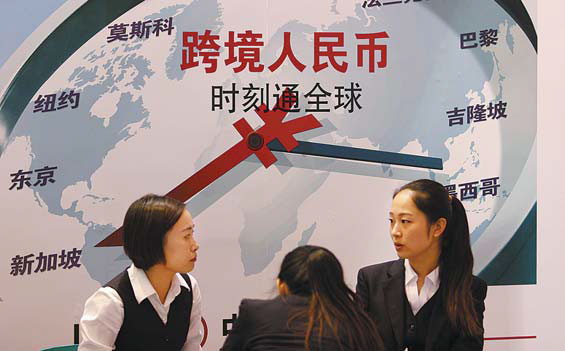Foreign firms yet to tap full yuan potential

| Benefits of transactions in yuan are publicized at an international financial exhibition in Wuhan, Hubei province. Sun Xinming / China Daily |
Renminbi ideally suited to invoice settlement of cross-border transactions, Survey finds
Overseas companies are yet to realize the full benefits of using the renminbi as an invoice currency when doing business with China, says a new survey commissioned by global banking and financial services organization HSBC Holdings Plc.
The survey, released on July 9, shows that although 59 percent of the respondents plan to increase cross-border activities with the Chinese mainland over the next 12 months, only 22 percent currently settle transactions in yuan.
According to HSBC, the figures also highlight the huge growth potential for yuan denominated trading activities with Chinese companies, as China overtook the United States to become the world's largest trading nation in 2013 with its trade in goods passing $4 trillion. HSBC estimates that about one-third of China's trade will be settled in yuan by 2015.
Mark Emmerson, head of global trade and receivables finance for HSBC in the United Kingdom, says there are many benefits to invoicing imports and exports in yuan for international businesses when trading with China.
Emmerson says most foreign companies move toward the yuan invoicing model at the request of their Chinese partners, who look favorably on those who use the yuan as it shows commitment and eliminates foreign exchange risks.
He says that most foreign companies use yuan to manage import and export, but some also do it for liquidity management reasons. For instance, foreign companies that export to China as well as manufacture in China would find it easier to receive yuan from Chinese customers and use this currency to manage their factories.
The survey questioned 1,304 international and Chinese companies that have cross-border trade activities. HSBC commissioned global market research firm Nielsen Holdings to conduct the survey. The field work for the survey was done between April 3 and May 7 this year.
According to the survey, two-thirds of the companies in the Chinese mainland and Hong Kong Special Administrative Region said foreign firms doing business with China gain both financial and relationship advantages while using the yuan, but awareness of these benefits varies widely in overseas markets.
Half of the respondents from Singapore, 44 percent from the US and 42 percent from the UK said they believe yuan usage brings financial benefits, but less than one third of their German and Canadian peers share the view.
More than half of the respondents from the United Arab Emirates said they see business relationship benefit from yuan adoption, compared with 46 percent in France and 40 percent in Australia.
David Pavitt, head of renminbi development for EMEA (Europe, Middle East and Africa) at HSBC, says the trend of yuan invoicing started a few years ago with smaller companies leading the way. The success of smaller companies in doing this has led to bigger companies wanting to do the same, and now yuan invoice practices are much more common.
This is because bigger companies find it harder to change their invoice systems, which involve significant infrastructure, accounting systems and staff support, Pavitt said.
The survey also found that outside China, businesses in France and Germany had the highest levels of yuan usage, amounting to 26 percent and 23 percent, respectively.
Among companies using the yuan to settle cross-border business, 59 percent expect to use it more over the next 12 months. About 32 percent of the companies that don't use the yuan also expect to do so in the future, the survey said.
cecily.liu@chinadaily.com.cn
(China Daily Africa Weekly 07/11/2014 page21)
Today's Top News
- Trump threatens 10% tariffs on 8 NATO allies
- PLA monitors US naval vessels transiting the Taiwan Strait
- The high cost of US cutting vaccine funding
- Visit highlights China's importance
- China fortifies energy security as risks rise
- Taiwan separatists warned of action































